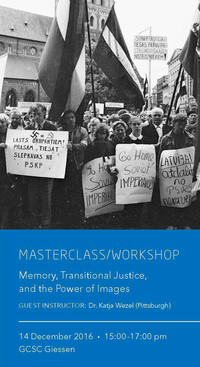Masterclass/Workshop
Memory, Transitional Justice, and the Power of Images
- https://www.uni-giessen.de/de/fbz/zentren/gizo/aktiv/2016/masterclasshi
- Masterclass/Workshop
- 2016-12-14T15:00:00+01:00
- 2016-12-14T17:00:00+01:00
- Memory, Transitional Justice, and the Power of Images
14.12.2016 von 15:00 bis 17:00 (Europe/Berlin / UTC100)
GCSC Gießen, room B25 Phil I
Guest Instructor: Dr. Katja Wezel (Pittsburgh)
Since the revival of Maurice Halbwachs’ term “collective memory” in the 1980s and 1990s, the notion that memory exists not only on the individual but on the social level has become widely accepted. Both aspects of memory are shaped by selective commemoration and amnesia, as the now globally influential research of Jan and Aleida Assmann has demonstrated. Public commemoration practices shape how collectives, and individuals within them, remember. These can include commemorative events and their portrayal in the media; the depiction of historical events in documentaries and fictional movies; or representations of the past in museums and exhibitions. In all these cases, images play a crucial role in influencing our memory of historical events.
Exploring the realm of mediated and medialized memory, this workshop will address the questions of
historical memory and commemoration practices as part of transitional justice. One central case study her e will be post-Communist Latvia, which regained independent statehood in 1991 as the Soviet Union collapsed. Post-Soviet democratization and battles over historical authority and political legitimacy, unleashed conflicting historical narratives from the different ethnic groups, resulting in fierce debates about World War II and its aftermath.
e will be post-Communist Latvia, which regained independent statehood in 1991 as the Soviet Union collapsed. Post-Soviet democratization and battles over historical authority and political legitimacy, unleashed conflicting historical narratives from the different ethnic groups, resulting in fierce debates about World War II and its aftermath.
These memory conflicts are particularly visible in
a) annual commemoration events for the Soviet deportations and the end of World War II,
b) documentaries and movies that depict World War II or Stalin’s crimes in connection to contemporary political issues, and
c) the country’s main historical museums that deal with the history of World War II.
Drawing on these examples, the workshop will encourage participants to consider the Latvian case in comparative and transnational contexts, such as the debate over the “Europeanization” of memory, where medialized public memory has contributed to processes of transitional justice.
For questions or further informations, please contact:
Paul Vickers (paul.vickers@gcsc.uni-giessen.de)
Victoria Harms (victoria.harms@herder-institut.de)
